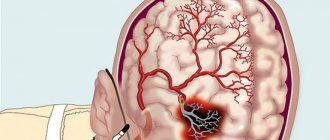How does miscarriage occur in early pregnancy?
As we have already said, in most cases it happens that the woman does not even suspect that she is pregnant and nothing bothers her. While waiting for her period to come, she simply registers that she is late, and a few days later her period begins, but it comes more heavily than usual and with pain.
Sometimes, an early miscarriage is characterized by only moderate pain in the lower abdomen and heavy bleeding, then the woman does not even go to the doctor if the bleeding stops soon. If bleeding occurs profusely for several days, then a visit to the doctor cannot be avoided.
In some cases, such delayed periods are very painful, and one day a blood clot comes out. Then we can definitely say about spontaneous miscarriage at an early stage. Usually this clot resembles a burst blood blister. This phenomenon always frightens those who encounter it for the first time. After the release of a blood clot, you must definitely consult a doctor: firstly, to undergo an examination and determine exactly what it was; secondly, to check if cleaning is needed.
A miscarriage is a phenomenon that makes both the body and soul suffer. Many people know that there is such a danger as spontaneous abortion, but not everyone knows about its causes and how it can be prevented.
If we talk about early miscarriage up to 12 weeks, then basically it is a test and warning for parents. A miscarriage at this stage of development indicates that either the mother’s body is not yet ready for the normal development of the baby inside it, or something is wrong with the health of both parents, and it needs to be strengthened so that the baby develops healthy in the future, and the body from unhealthy and in the future it will get rid of itself.
Periods when there is a possibility of miscarriage
When a woman’s body rejects an embryo, which occurs during the process of carrying a baby until the twenty-second week, this process is called a miscarriage or spontaneous termination of pregnancy.
If this process occurs before the twelfth week of pregnancy, it is called early. In the case when the process of termination of pregnancy was between the twelfth and twenty-second week, in this case the miscarriage is called late.
The concept of “premature birth” refers to the spontaneous interruption of the process of bearing a baby, observed in the period from 23 to 37 weeks. When fetal rejection occurs during 37-42 weeks, such delivery will be called urgent, when a completely viable baby is born.
Late birth - when a pregnant woman gives birth after the forty-second week, this does not have the best effect on the condition of the baby, as well as the process of childbirth itself. From a medical point of view, when a baby is born before the twenty-second week, he is a fetus. But if the baby is born between 22 and 37 weeks, then the baby is considered a premature newborn. His weight is no more than half a kilogram, and his height, as a rule, is about twenty-five centimeters.
However, thanks to the achievements of modern medicine, children born today, even if they have little weight, have a great chance of survival. Nowadays, raising a baby born at seven months is not a problem.
Early miscarriage: causes
The reasons for miscarriage in the early stages of pregnancy can be very different - from hormonal imbalance to an emotional state. To avoid consequences, it is important to establish why spontaneous abortion occurred.
Genetic disorder in the fetus
In the first weeks of pregnancy, special attention is paid to the healthy formation of all organs of the future person, which requires equal 23 chromosomes from mom and dad. And if one of them suddenly contains a mutating element, then it is recognized as incompetent, and a miscarriage occurs in the early stages.
The presence of such elements is influenced by the environment, viruses, and occupational hazards. It is very difficult to avoid these factors; you can only reduce the risk of their influence on the body by going on vacation: to fresh air and for a long time. By carrying out a miscarriage, the body thus produces natural selection, characteristic of all life on earth.
Hormonal disorders
It is known that hormones are responsible for the good functioning of a woman’s body, so their incorrect balance in the body can lead to early miscarriage. Also, a lack of the hormone progesterone or an excess of the male hormone causes this phenomenon. If such a problem is diagnosed in a woman in advance, then before planning a pregnancy she is prescribed hormonal therapy, which helps avoid miscarriage.
Rhesus conflict
It is not for nothing that when planning a pregnancy, they are required to take a blood test to determine the group of both the mother and the father (if the mother turns out to have a negative Rh factor). In this case, the father’s Rh is important, since its opposite indicator can lead to the development of an Rh conflict, when the embryo inherits the father’s positive Rh, and the mother’s body identifies its tissues as foreign and rejects them, saving itself, as it seems.
If the father also has a negative Rh factor, then such a problem does not arise. With timely diagnosis of such a pathology, the hormone progesterone is used, which plays a protective role for the embryo and eliminates this cause of spontaneous miscarriage in the early stages.
Infections
Infection is bad in any case. If you know that you or your partner have a sexually transmitted infection, you need to get rid of it before conception. When a pregnancy occurs with this diagnosis, the fetus becomes infected and, again, the body gets rid of the embryo at an early stage.
Diseases of internal organs
Any increase in temperature up to 38 degrees, caused by a disease of the internal organs, can cause early miscarriage. Typically, such a temperature is accompanied by intoxication of the entire body, and therefore it is unable to hold the embryo. This is why it is so important to undergo a complete examination when planning a pregnancy in order to detect and treat all chronic diseases and get vaccinated if necessary.
Abortion
As you know, this is an intervention in the normal life of the female body. If an abortion has ever taken place, it can lead either to habitual spontaneous miscarriages in the early stages or to infertility.
Medicines
In the first trimester, the use of any medications is not recommended at all, as this can lead to defects in fetal development. There are also herbs that are contraindicated in early pregnancy: parsley, nettle, cornflower, St. John's wort, tansy. Their use can cause early miscarriage.
Bad mood
Severe stress, grief, and prolonged mental stress can negatively affect the birth of a new life and lead to miscarriage in the early stages of pregnancy. In this case, with the recommendation of a doctor, it is possible to take some sedatives.
Lifestyle
You need to change your lifestyle when planning a pregnancy. Getting rid of bad habits, a balanced and nutritious diet are the first conditions for the development of a healthy child, but the opposite can lead to early miscarriage.
Physical impact
Unsuccessful falls and heavy lifting can cause early miscarriage. If the woman is healthy, then this effect must be very strong to cause termination of pregnancy.
Possible causes of pathology
The reasons for the expulsion of the fertilized egg may be associated with pathologies of the mother’s reproductive system, as well as abnormalities in the development of the fetus.
Most often it can be triggered by:
- sexually transmitted infections in the mother (syphilis, chlamydia);
- chromosomal defects of the embryo;
- previous surgical abortions;
- increased levels of male sex hormones associated with impaired ovarian function (polycystic ovary syndrome), adrenal tumors;
- severe chronic diseases (diabetes mellitus, systemic autoimmune pathologies);
- Rhesus conflict;
- thyroid dysfunction;
- intoxication with alcohol, heavy metals, chemicals;
- diseases and abnormalities in the structure of the uterus (fibroids, fibroids, infantilism);
- hormonal disorders in the mother, especially insufficiency of the progesterone component in the second phase of the menstrual cycle;
- use of an intrauterine device;
- mechanical injuries to the pelvis as a result of blows to the stomach, falls;
- invasive procedures on the uterus (amniocynthesis, chorionic villus biopsy).
Risk factors include chronic alcohol abuse and smoking in both parents. If partners are over 35 years old at the time of conception, this also increases the risk of spontaneous abortion up to 9-20 weeks. The risk of premature expulsion of the fetus increases the risk of taking certain medications - non-steroidal anti-inflammatory drugs (aspirin, ibuprofen), antidepressants, antipsychotics.
Early miscarriage: symptoms
The most common signs of early miscarriage are pain in the lower abdomen and bleeding. Also, unpleasant sensations from the lower abdomen can spread to the lower back. This pain is periodic. Vaginal discharge indicates a threat of early miscarriage. If they have a reddish or even brownish tint, you should consult a doctor to avoid miscarriage.
With small discharge, the chances of maintaining pregnancy are much higher than with heavy bleeding. If you observe bleeding with pieces of tissue, this indicates that a miscarriage has already occurred.
Often the cause of miscarriage is the tone of the uterus, but only in cases where it is accompanied by discomfort for the mother and pain. If it is not accompanied by anything, then doctors’ recommendations stop at reducing physical activity and reducing stressful situations.
In some cases, even after the above symptoms, pregnancy proceeds normally, only under more careful medical supervision, then they talk about the threat of miscarriage. Read more about the threat of miscarriage→
The symptoms of spontaneous miscarriage at any stage of pregnancy are relatively similar. They may only be accompanied by stronger pain and copious discharge.
Symptoms of miscarriage in the second trimester:
- damage to the amniotic fluid sac is indicated by fluid dripping from the vagina, in which case contacting a doctor should be immediate;
- vaginal bleeding is a sign of miscarriage in any trimester of pregnancy;
- blood clots appear during urination, accompanied by pain;
- internal bleeding, which can be indicated by very severe pain in the shoulder or in the stomach area.
Results and conclusions
If a miscarriage occurs in the first trimester, a woman can avoid danger to her life only if she consults a doctor in time. Otherwise, there is a high probability of developing bleeding from the uterus and death from blood loss, or the occurrence of sepsis, which can also be fatal.
If you notice that after a delay, the menstruation that occurs is different from the previous ones (increased pain, heavier discharge), you must definitely meet with a gynecologist and discuss these symptoms with him.
If you experience severe vaginal bleeding that does not stop and your general condition worsens (weakness, spots before your eyes, dizziness, tinnitus), dial an ambulance as soon as possible and wait for the doctors to arrive.
How is threatened miscarriage diagnosed?
If your pregnancy is planned, and you have gone through all the necessary preparation procedures that the doctor told you about, taken all the tests and treated all the detected diseases, then the possibility of miscarriage is reduced to a minimum. If any contraindications were discovered in advance, then attention is paid to them already when the baby is conceived. In this case, the diagnosis of the threat of miscarriage takes place at the planning stage, and treatment is prescribed in advance.
If pregnancy occurs spontaneously, without preliminary treatment and examination, then any gynecologist can diagnose a miscarriage or its threat during a routine examination. When examining a woman who comes in with a delay problem, the doctor determines the expected duration of pregnancy.
Further, according to the expected period, he:
- checks the size of the uterus for the given period;
- checks for uterine tone;
- determines whether the cervix is closed;
- pays attention to the nature of the discharge (bloody or mucous).
The most reliable way to diagnose miscarriage or premature birth at a later stage is a transvaginal ultrasound performed by an experienced doctor. Using this method, the length of the cervix and the condition of the internal os are checked.
Diagnosis of miscarriage
If a pregnant woman feels that any abnormalities are occurring in her body, she should immediately seek medical help. There are various signs of miscarriage, however, the doctor still takes into account the clinical symptoms.
The main method used in the study of miscarriage is ultrasound diagnostics. Since it determines the fact, it also helps to determine the method by which the treatment will be performed, that is, whether it is necessary to continue the therapy aimed at maintaining the pregnancy or not. A method that helps measure the level of hCG in the blood is often used, since if the fetus has died, its level decreases.
Treatment of threatened miscarriage in the early stages
The most basic and first thing the doctor advises if there is a threat of miscarriage at any stage of pregnancy is to adhere to bed rest. In some cases, in order to maintain the pregnancy, the woman is even forbidden to get out of bed.
It is also recommended to reduce the level of anxiety, bad news and thoughts. Already from the first weeks of existence, the nascent life feels you from the inside; any of your excitement can negatively affect its condition. And disturbances in the condition can lead to its rejection by your body. To avoid these nervous tensions, your doctor may prescribe valerian or motherwort.
You yourself can use relaxation therapy: sit comfortably on a sofa or chair and think about something good. The most appropriate in this case may be dreams about the future baby, choosing a name, mentally drawing his portrait. But all this is after consultation with a doctor.
If the threat of miscarriage is more serious and just good thoughts are not enough, then the first thing the doctor does is determine the cause. After determining the cause of the threat of miscarriage in the first weeks of pregnancy, hormonal drugs are prescribed, which are designed to maintain a good pregnancy.
You may be prescribed progesterone (it is part of Utrozhestan, Duphaston), you may be prescribed drugs for hyperandrogenism (with a large amount of male hormones), as well as drugs if there is a threat of Rh conflict.
If the doctor deems it necessary, they may conduct an additional intrauterine ultrasound examination. If insufficiency is detected with this diagnostic method, then sutures are placed on the cervix, which stop the fertilized egg inside the uterus. This operation is performed in a hospital and under anesthesia, while relaxing drugs are injected into the uterus.
Most cases of threatened miscarriage in early pregnancy are treated in a hospital; sometimes women have to remain under the supervision of doctors until the very end of pregnancy, that is, until childbirth. In some cases, treatment begins in a hospital, and then proceeds to home conditions while observing bed rest. Sometimes, having undergone treatment for a threatened miscarriage in the early stages, a woman does not return to it until the birth.
Treatment
Bed rest and complete rest are the basis of therapy during threatened miscarriage. Sometimes doctors prohibit you from getting out of bed and walking at all. This is necessary to maintain pregnancy. You should limit your worries and worries, think only about the good and look at pleasant things.
Note! Any emotional impulses of the mother are transmitted to the fetus.
Gynecologists often recommend taking a decoction of motherwort or valerian to establish internal harmony and reduce stress. If you know how, you can practice meditative techniques or listen to soothing music: sounds of nature, beautiful slow musical compositions. There should be no anxiety or sadness. Psychologists advise taking up drawing or handicrafts: it distracts from anxious thoughts and fills the day.
Drug therapy
If the cause of the threat of miscarriage is hormonal imbalance, hormonal medications are prescribed. They must be taken strictly according to the doctor’s regimen, without self-medication. Hormonal medications are selected only by a gynecologist, based on the diagnosis of the pathology. If it is necessary to increase progesterone levels, Utrozhestan, Duphaston and other hormonal agents are prescribed.
Progesterone levels can also be increased with non-drug treatment. This is especially true for women who are not suitable for hormone therapy. Progesterone deficiency reduces the chance of conceiving a child at all, as it coordinates the process of attachment of the fertilized egg to the body of the uterus.
With increased production of testosterone in the body, medications are prescribed to reduce the level of the male hormone. If there is a conflict between the Rh factor, other drugs are prescribed.
Where is threatened miscarriage treated? It all depends on the woman’s condition and the causes of the pathology. Sometimes a woman is left in the hospital until delivery, sometimes inpatient treatment is replaced with outpatient treatment.
Folk remedies to increase progesterone
The problem of progesterone deficiency can be resolved with proper nutrition and herbal treatments. Hormone therapy is not suitable for all women; it often leads to undesirable side effects such as weight gain or other troubles.
External causes of decreased progesterone production:
- chronic stress condition;
- unbalanced diet;
- excessive mental/physical stress;
- drug use;
- polluted environment;
- contraceptive abuse;
- hormonal, drug treatment;
- bad heredity.
Internal reasons:
- pathology of blood flow;
- placental insufficiency;
- internal infectious diseases;
- somatic diseases;
- ovarian pathologies;
- kidney diseases;
- thyroid problems.
A woman’s appearance can also indicate problems with progesterone production:
- acne;
- oily skin on the face;
- recurrent headaches;
- excessive body hair;
- disruptions in the menstrual cycle;
- sore nipples and mammary glands;
- formation of a fatty belt in the abdominal area;
- irritability and bad mood.
Already external signs should alert a woman; it is better to immediately undergo a test for the production of progesterone by the body. To increase progesterone levels, you need to establish proper nutrition and use herbal remedies (after the approval of a gynecologist).
Diet
A balanced diet helps with minor deviations in the body's production of progesterone. However, without high-quality nutrition it is impossible to bear a healthy child even in the absence of progesterone deficiency. A pregnant woman should saturate her body with useful microelements and vitamins.
Required products:
- dairy/fermented milk products, cheese;
- seafood, caviar, sea fish, seaweed;
- dried fruits, nuts, pumpkin and sunflower seeds;
- dark natural chocolate;
- rabbit meat and beef liver;
- beans, lentils, peas, soybeans;
- dried fruits, wheat bran;
- buckwheat, whole grains;
- bananas, raspberries, avocados;
- leafy vegetables (spinach, greens);
- olives and olive oil.
The listed products promote the active production of progesterone. However, when consuming these products, it is necessary to exclude indulgence in sweets and coffee. Together with regular walks in nature and moderate physical activity, proper nutrition will balance hormonal levels.
It is also necessary to monitor the intake of vitamins and minerals from food. To increase progesterone levels you need:
- magnesium;
- vitamin C;
- vitamin B6;
- zinc.
Keep in mind that weight gain negatively affects progesterone production, and systematic weight loss helps normalize hormonal levels.
Herbal treatment
Medicinal herbs are given by nature itself, if used correctly (and under the supervision of a gynecologist).
Useful herbs and roots:
- raspberry leaves;
- hog uterus;
- chaste vitex;
- ordinary cuff;
- Potentilla gossamer;
- plantain seeds;
- wild yam;
- Baikal skullcap;
- angelica
If you have a progesterone deficiency, you should not eat rowan, licorice and mint.
Raspberry leaf tea
Two pinches of dry raw material are poured with a cup of boiling water and left (wrapped) for an hour. This portion should be divided into parts and drunk throughout the day. Raspberry leaves are not harmful to health, so you can drink tea all the time.
Raspberry leaves are combined with wild yam. The herbs are mixed in equal quantities, a pinch of the mixture is steamed with boiling water and infused. This drink is consumed before meals at least three times a day. However, wild yam has contraindications for some somatic diseases.
Psyllium seeds and mantle
How to use psyllium seeds to increase progesterone? They are combined with an ordinary cuff. A teaspoon of seeds and a pinch of herbs are poured with boiling water (a glass) and left to brew. When the drink has cooled, it is filtered. Drink one tablespoon three times a day.
Prutnyak
Chasteberry (or chasteberry) also helps increase progesterone. A couple of pinches of dry herb are poured with boiling water and left to infuse for several hours. The filtered infusion is drunk in small portions throughout the day.
Cinquefoil anseri
Potentilla herb must be cooked in a water bath. To do this, a pinch of raw material is poured with boiling water in an enamel mug and immersed in a pan of boiling water. Boil the herb for 15 minutes, then (wrapped) leave it to infuse in the kitchen until it cools. The decoction is used 4 times a day, half a cup (warmed).
Prevention
In most cases, it is possible to avoid early miscarriage. If a couple approaches their decision carefully and responsibly, then they will be examined by a doctor in time, which will reveal all sorts of deviations and inconsistencies in the bodies of the man and woman. A preliminary examination will allow you to cure all kinds of infectious and hormonal diseases that can cause a miscarriage later.
Another six months before the planned conception, the couple’s lifestyle should be changed. Getting rid of bad habits will help reduce the risk of miscarriage.
A categorical refusal to abort a girl who has not yet given birth will help reduce the occurrence of miscarriages in subsequent pregnancies.
What increases the risk of miscarriage
- Mother's age. The risk of miscarriage in women aged 20–24 years is 8.9%, after 45 years – 74.7% Maternal age and fetal loss: population based register linkage study.
- Bad habits. Smoking and drugs (in any quantities), alcohol (more than 50 ml of strong drinks per week).
- Caffeine. Small amounts of caffeine do not affect the fetus, so up to 200 mg of caffeine per day can be taken. Usually this norm is twice as high. Look up how much caffeine is in tea and coffee so you don't get confused.
- Obesity.
Consequences after early miscarriage
From a medical point of view, serious consequences after spontaneous miscarriage in the early stages are extremely rare. Big problems can happen if this miscarriage is caused independently with the help of medications or folk remedies, or if parts of the fetus remain in the uterus, which most often happens at a later stage during miscarriages.
It is in order to avoid such problems in the early stages that gynecologists prefer to do preventive cleaning of the uterus after a miscarriage. If a woman goes to see a doctor, she always undergoes a control ultrasound.
Many people believe that the consequence after one miscarriage is subsequent spontaneous termination of pregnancy. But in reality this is not the case. Subsequent miscarriages occur after the first only if the cause has not been identified or if it has not been eliminated.
A miscarriage in early pregnancy does not have serious consequences only if you consult a doctor in a timely manner. If this fact is neglected, severe uterine bleeding may occur, that is, large loss of blood, which can be fatal.
If your next period does not go as usual (heavier or with severe pain), it is better to consult a doctor, in case you were pregnant and did not notice it. The answer to the question of what to do in case of an early miscarriage is to consult a doctor, if it is very bad, then even call an ambulance.
Author
Editorial staff of the portal Mama66.ru
Share
Is it worth continuing the pregnancy?
It is possible to save a child in the event of a threatened or incipient miscarriage if assistance is provided by a qualified doctor. But this is not always advisable, and in some cases the doctor recommends not to interfere with the process. This is usually associated with cases when a pregnant woman’s body rejects an inferior fetus - with a genetic anomaly and, if preserved and carried, this can lead to the birth of a child with serious birth defects and neurological diseases.
This decision is more justified if the mother has serious diseases of the kidneys, thyroid gland, adrenal glands, which lead to the birth of physically handicapped children. In any case, the patient should listen to the doctor and soberly assess the chances of giving birth to a healthy child.
Types
Miscarriages are divided into several types:
- Inevitable (incomplete). He is accompanied by severe pain, covering the lower back and lower abdomen. Accompanied by cervical dilatation and uterine bleeding. A miscarriage is considered inevitable when a rupture of the membranes forms and the internal os of the uterus opens. Continuous pain and discharge are signs of an incomplete miscarriage.
- Complete - spontaneous termination of pregnancy, in which the embryo or fetus is completely expelled from the uterine cavity. After complete cleansing of the organs, pain, spasms and bleeding disappear. Surgery is rarely required.
- Failed miscarriage or frozen pregnancy. The dead fetus remains in the uterus; at first, no symptoms are observed. Most often it is diagnosed at a routine appointment with a gynecologist or by ultrasound. Surgery is mandatory.
- Repeated miscarriage. Happens in about one in a hundred couples. When a woman has three pregnancies in a row end in arbitrary termination in the early stages.
- Anembryony. Fertilization and attachment of the egg occurs, upon examination, an enlargement of the uterus is observed, a fertilized egg is formed, and other symptoms of pregnancy are also present. But the fetus either does not develop or dies at the initial stage.
- Chorioadenoma. Develops due to genetic disorders. In place of the amniotic sac, just a piece of tissue is formed, which gradually increases in size.
If these conditions are diagnosed early, the woman must undergo an abortion for medical reasons.
Spontaneous abortion or menstruation?
It is possible to determine that a pregnancy has been terminated and that another menstruation has not occurred by monitoring the level of hCG in the blood and measuring basal body temperature.
Basal temperature is the lowest body temperature, which is measured immediately after sleep, without getting out of bed.
- A temperature of 37 degrees is considered normal during pregnancy. Its decrease indicates hormonal disorders that threaten miscarriage or frozen pregnancy. This diagnostic method is relevant only in the first 4–5 months.
Doctors recommend monitoring basal temperature not only for pregnant women, but also for girls at the planning stage
- Women who have experienced an early miscarriage notice that during menstruation the discharge is not as heavy, and in some cases you can see pale gray particles of the fertilized egg. In addition, with spontaneous abortion, bleeding lasts longer, reaching several weeks.
- If there is any doubt about the cause of the bleeding, you can use a pregnancy test or get tested for hCG. If a miscarriage occurs, the hCG level remains elevated for ten days, and the test will show a second “pregnant” line.











